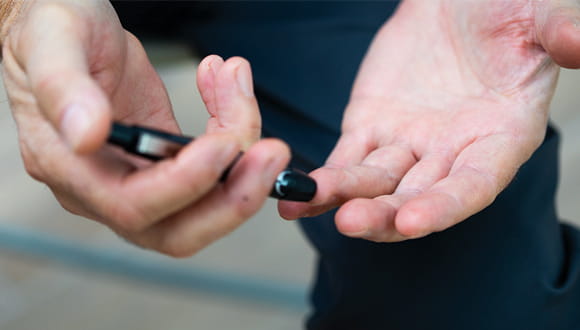Diabetes & Erectile Dysfunction: Did You Know There's a Connection?
Aug. 24, 2021At first consideration, it may not seem as though erectile dysfunction and diabetes are related.
However, each affect just about the same number of men in the U.S. — around 18 million men — and both are becoming increasingly more common.
Coincidence? Nope.
It's easy to brush health warnings off, especially those related to conditions without symptoms, like early-stage diabetes. But did you know that getting your blood sugar under control could be the difference between having a healthy sex life and having trouble getting an erection at a very young age? The reality is that diabetes and erectile dysfunction are intimately related. Poor blood sugar control can permanently ruin sexual function at a very early age.
In fact, a 2007 study found that 90% of men with erectile dysfunction either had diabetes or at least one of the risk factors for it, such as high blood pressure, high cholesterol and smoking.
How does diabetes cause erection problems?
Erectile dysfunction is a men's health complaint characterized by having issues obtaining and/or maintaining an erection.
As far as its anatomical explanation goes, it is typically caused by one or more of the following:
- Inadequate blood flow to the penis, which is supplied by the penile arteries
- Nerve dysfunction in the penis
- A lack of sexually enticing stimulation, as perceived by your brain
While many people focus on the last cause the most, often assuming that failure to get an erection is mostly psychological, when you think about how type 2 diabetes affects the body on a microscopic level, the connection to severe erectile function becomes clearer and clearer. As it turns out, having high blood sugar — the defining sign of diabetes — results in damage to nerves and blood vessels throughout the body.
The resulting nerve damage, also called neuropathy, typically starts at the toes and fingers and, over time, works its way upwards — slowly causing a loss of sense of feeling in the affected body parts. Smaller arteries are affected first. The feet and hands are the classic examples, but the arterial supply of the penis is a similarly small blood vessel and another 'end point' of the body.
Over time, the effects of high blood sugar — the damaged blood vessels and nerves — contribute to reduced blood flow to the penis and difficulty achieving and keeping an erection.
The strong relationship between diabetes and erectile dysfunction is well known among medical professionals, but much less so among the general population. It's important for men of all ages to learn about this connection, getting screened for elevated blood sugar and discussing ways to get their blood sugar under control if that is needed.
The lifestyle changes that reduce your diabetes risk can also help prevent erectile dysfunction
The link between diabetes and erectile dysfunction has meaning for all men — those who are already diagnosed with either diabetes or erectile dysfunction, as well as those who aren't.
Diabetes is underdiagnosed. It's not uncommon for a man to make his way to the doctor for erectile dysfunction, only to be told shortly afterward that he has early, or even advanced, diabetes. If you're having difficulty getting or maintaining an erection, it's crucial to consult a men's health specialist who considers your whole health, not just your penile health.
And the sooner you get your diabetes under control, the better, since improving your blood sugar can help prevent the nerve and blood vessel damage that can contribute to devastating erectile dysfunction. In addition, the longer diabetes goes unchecked, the more damage it can cause to your body and the more irreversible its effects can become.
If you've already been diagnosed with type 2 diabetes, work with your doctor to ensure your condition is well-controlled, or at least well on its way to good control. He or she can also help you understand whether there are more steps you can take to better manage it.
Four lifestyle changes that can help get diabetes under control include:
- Improving your diet – choose whole grains, fruits and vegetables over refined carbohydrates as often as possible, as the simple carbs found in processed goods and junk foods can cause spikes in your blood sugar
- Losing weight – even losing just 7% of your body weight can reduce your risk of diabetes and/or the risk of complications associated with diabetes
- Getting active – exercise can improve your heart health and help you lose weight, both of which can help you better manage your condition
- Stopping smoking – smoking makes managing diabetes difficult since it affects your body's ability to regulate insulin
The good news is that these are all the same lifestyle changes that help prevent erectile dysfunction from developing in non-diabetic men as well. They're also the ones that can help reduce erectile dysfunction or low testosterone symptoms you may already be experiencing.
And one last note, don't get caught thinking you might be too young to worry about any of this. Diabetes is on the rise in young men under 30. To guard both your overall health and your sexual health, it's important to take action to reduce your risk sooner rather than later. Additionally, men should know that diabetes can contribute to low testosterone in men of any age — a common cause of having sluggish sex drive and a separate issue that can worsen sexual function.


